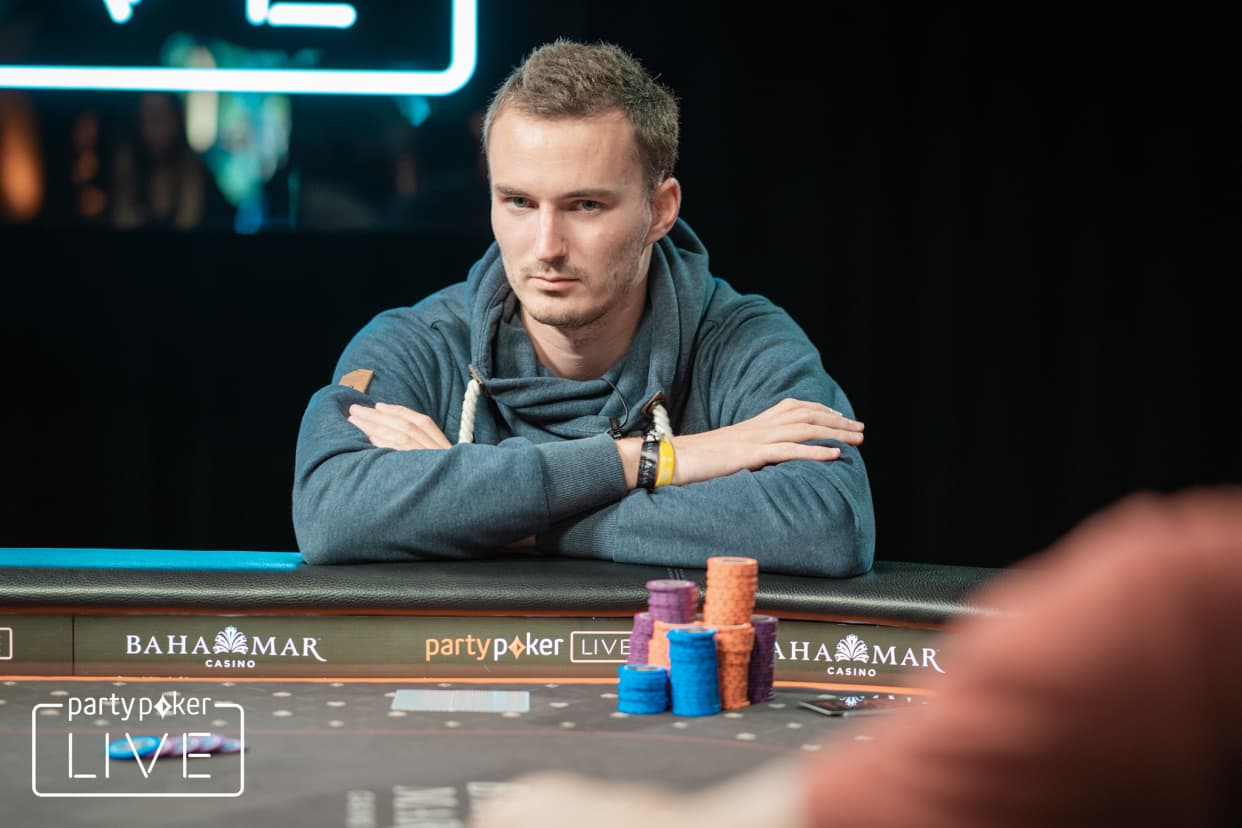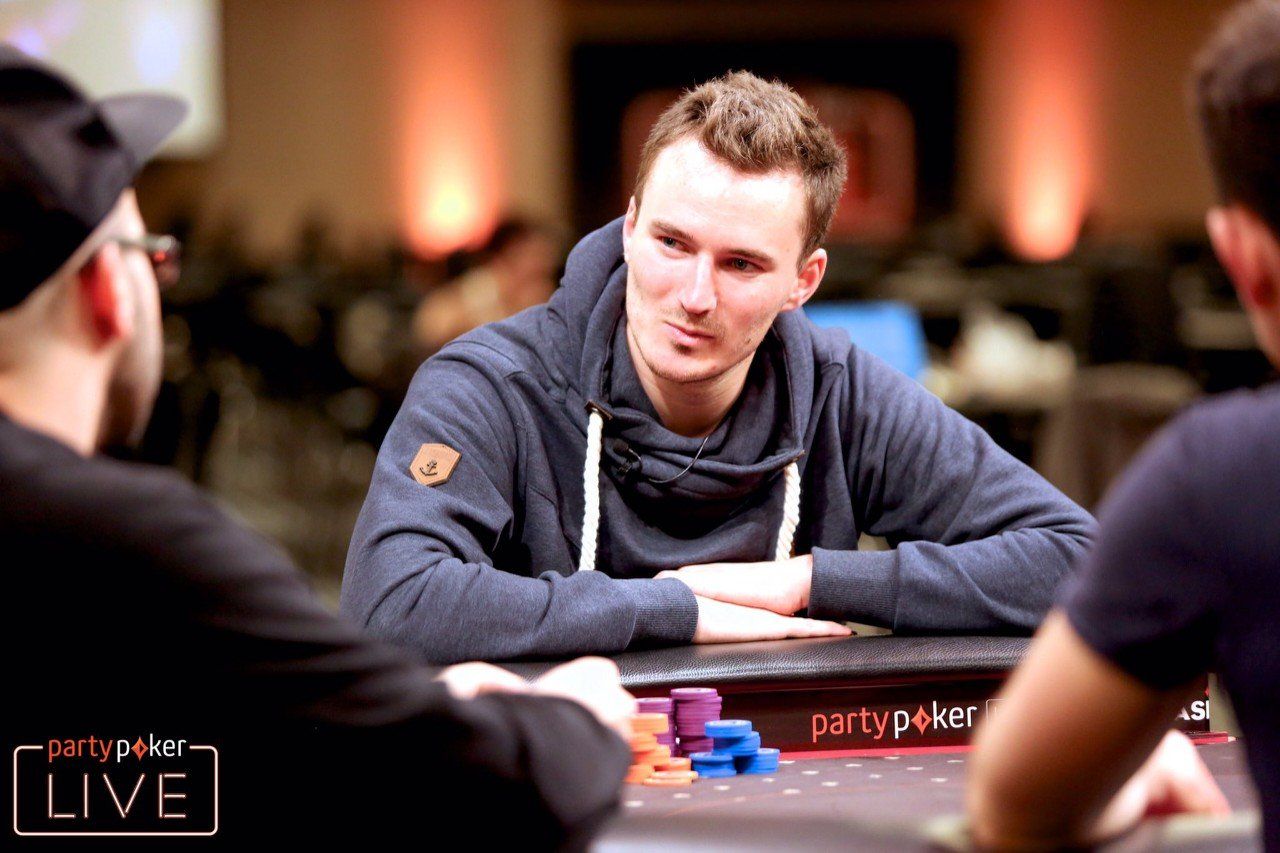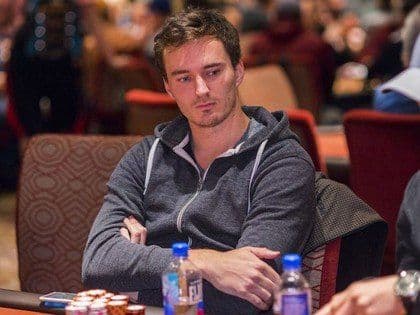Interview with Germany’s rising star Steffen Sontheimer
In January 2017,Fedor Holz predicted that 2017 would be Sontheimer’s “breakout year”, and he shared this thought publicly on Twitter.
Predicting the breakout year of @RunGo0seRun. Best player in the game right now.
— Fedor Holz (@CrownUpGuy) January 26, 2017
A few months later Sontheimer claimed the Purple Jacket at the Poker Masters. Since then,he has become a regular figure on the High Roller circuit and has accumulated over US$13 million in live earnings.
Interview by Gaelle Jaudon

Somuchpoker (SMP):You arrived on the live circuit in 2015, but first you were an online cash game player. You had the supernova elite status for two years. It’s a very different type of game and lifestyle. I saw that you started playing live at a high roller tournament in Miami. What pushed you to make that transition? What was your motivation?
Steffen Sontheimer (S.S):Yeah, it’s actually a very long story. I started poker playing cash games, and I was only playing that, and the moment I went pro was during a trip with my buddies to Canada, to play Scoops, in May 2014. They invited me to start playing some tournaments. I was with Reiner Kempe, Fedor Holz, and a few others. It was pretty easy because I kept grinding cash games, and I was playing tournaments on Sundays. A bit after PokerStars changed the supernova elite system and I was seeing my friends winning everything, I thought why not give it a shot. If they can do it, I can do it!
SMP:On your podcast with Joe Ingram, you had a very interesting thought, when you compared the live tournament to a decathlon, because of all the different aspects of the game—ICM, short stack play, deep stack play, etc. And you also said that in the live circuit the pros are not really working on all of those aspects. Can you develop that?
S.S:Yeah, I really like the comparison with the decathlon because it’s really the same. Those people are the kings of the athletes, or that’s what we call them in Germany at least, but in each individual discipline alone, they have no shot at being the best. If you do 10 different things, there is no way you are the strongest at jumping, at throwing, at the 100 meter race, etc. In poker it’s the same. In the other formats, you can be a specialist if you play 20 big blinds, the cap games, cash game no ante, 100 bb+ etc. Those guys would be better in that discipline than tournament players. And sit n go is not a real thing anymore; it’s not running like it used to, but those players are better at ICM than all the tournament players. For me, it’s important; that’s why I was always playing cash, to be sure that I was winning and that I was really good in that field. It can get a little boring maybe, and that’s why I add other things. It’s similar; it’s not like you learn a totally new game, but it’s a very different kind of play and discipline.
SMP:You also declared—I’m quoting you—“the so-called tournament player is also another term for people not working hard.” This might be a little upsetting for them. What did you mean exactly?
S.S:It’s kind of a stereotype. It’s just that if you don’t have a real background and had a discipline where you come from and are really good at, it’s tough to be working at 10 different disciplines. If you just say you’re a tournament player, you’re not really training at playing tournaments. Like a decathlon guy is not training at ‘decathlon’; he’s focusing on one or the other discipline every time he trains, and he’s doing the next discipline the next day. It’s also something that I experienced from knowing a lot of people in poker. Nothing is ever really done completely. I wouldn’t say it’s always like that, obviously. For example, the top guys in poker, like the American group with David Peters and others, are working really, really hard at all the disciplines. But the average tournament player is just playing tournaments and not really practicing anything; it’s kind of an excuse. You have that big variance in tournaments, and there’s not really a big graph that can tell you if you’re good or not. The variance makes it easy for people to think they are good.
SMP: In one of your Twitch games, you played against Linus “LLinusLLove” Loeliger, who is considered to be one of the best online cash game players, and you said he was actually your neighbor. He’s living in the flat next to yours, which is quite fun. Do you know him well personally?
S.S:Yeah, he’s my neighbour. We’re not buddies who hang out, but there is one specific place in Vienna where poker players meet each other and have breakfast, and I sometimes see him walking by with another friend. I know the spot where he goes climbing, and I have friends who see him sometimes.
SMP:And what do you think explains why he’s one of the best online players today?
S.S:Well, I’m pretty sure he was the guy working the hardest for years. I never saw him outside of his flat for years. I remember one party that his roommate had. I arrived at 9pm and left at 5am, and I didn’t seen him at all. I asked his roommate where he was, and he told me “oh, he’s here! He’s just solving some solvers in his office.” So he was just there all the time and never showed up. He was motivated to be the best and keep working more and more. That’s what I also heard from his friends. I really haven’t seen him outside too much. He just keeps running the solvers, studying all the spots, preparing for everything that might come up. He’s a super smart guy, obviously, so all those things together help to make him the best right now. And I always refer to the 100 BB+ cash game area, not necessarily the best in tournaments.

SMP:Do you still play a lot of cash games yourself?
S.S:Yeah, I like to keep playing for practice reasons, and the past couple of months I’ve actually enjoyed it more again. At some point it became a little boring, because it was always the same for me, but now I really enjoy not grinding away the whole night. It’s nice to play for an hour at 4pm and then have some time off and be a little more flexible and not have to grind for a week. It’s tough when you’re travelling for tournaments, and when you finally come back home, you don’t want to spend the next week just sitting in front of your computer.
SMP:Tell us about your team, NoLimitGG. It is a poker team but also an esport team.
S.S:Yeah, it’s from an idea that came out last year after Vegas. It was Stefan Schillhabel who started it. We were hanging out after I had just busted the Main Event and the others had busted their events, and we were all a bit over poker at that moment. After a couple of weeks of poker, it’s draining, and last year in Vegas was not a great success, so everyone was a little pissed. Stefan was the most over poker at that time, and he wanted to do something new. He’d had this idea for a while to start an esport team. He always thought that all the stuff about poker was all kind of the same and also that most people started poker as a hobby but only a very few were trying to make a living out of it. You have to be a bit like an athlete at some point. You have to have very good discipline—even if everyone sees that I’m drinking beer and eating junk food! You have to train hard to keep ahead of the curve. We—as a crew—we figured out a few things that helped us, and Stefan had the idea to bring that to esport. We had the idea to start a poker team and work in esport too. It’s similar. People can play esport for fun, and the best can make a living out of it. We didn’t want to invest too much money, so we tried to get income from our poker and have sponsors for the Twitch streams. It was pretty easy. All the people we approached were really happy about the idea. We got Kenny Hallaert, a super great guy, Thomas Muelhoecker, Fedor Holz, Josip Simunic, probably the best Austrian player, Reiner Kempe, Ana Marquez, Manig Loeser—all those great players agreed to join us immediately. We had our streams, and everyone is testing things a little; it’s not an everyday thing for any of us. We can’t be the next Lex Vedlhuis for the streams if we want to stay on top of the poker world at the same time. It’s just not possible when you stream 10 hours a day. Each of us streaming like once a month or once every two weeks makes it interesting. Then, we got a Counter-strike team. We got a new flat for them. They’re success right now is not important; it’s more about giving a structure to that and seeing how they live, how they work, how they try to improve their game. We have a performance coach and do team-building stuff—all to have a team that works together toward one goal. The esport part is more on Stefan Schillhabel, and I do some poker streams, which is really fun.
SMP:You said earlier that you sometimes enjoy playing cash games more now, but it also seems like poker doesn’t bring you really euphoric moments anymore. During your big victory at the partypoker high roller in the Bahamas, you said yourself that there was no celebration. For many people that might be difficult to understand.
S.S:To be successful at poker the main thing to do is to cut off your emotions a little. If it’s my job, I can’t celebrate if I win something, because I also can’t be pissed about it when I lose. You can’t just take the positive side. And, most of the time, you’re losing. For me, 2018 was a really bad year, and you have to get used to it. Everyone is also looking at the numbers when you have results, but that’s not really the main deal. Of course, most people know how high rollers work and that you have to sell action. I’m not putting $250K in one buy-in, and I’m also not winning like $3.7 million just for myself. That would be a completely different feeling. In that tournament, we were like 34 runners, and this is the kind of tournament that you play every day or every week in Vegas, with the same field. At some point, you will win some of those. So, for me, whether it’s a $50K or a $250K it’s not too big of a difference; maybe it is for the backers. You know it’s gonna happen one day. Actually, I remember the last hand. It was AK vs AQ all in, and I’d had that before in a previous tournament. I was just thinking, “please give it to me this time.” I was feeling relieved—maybe like a soccer player scoring a goal. I guess that’s what you get used to it. It’s a bit sad on the one hand, but it’s also good, on the other hand, to handle it like that when you want to keep playing poker at that level.
SMP:And how have you dealt with downswings during your career?
S.S:Dealing with downswings is something you have to be good at if you want to succeed. Everyone I know in poker had to experience that, and it’s a part of the game. You have to see it like that. For me, it always helped a lot to rationalize things. I know the downswings will happen, and I shouldn’t be pissed about that, but it’s not really working like that. I think it will happen to everyone, even to me, and my only job now is to try to perform better than before, throughout the year, while having that downswing. Sometimes, I can have a session where I have every setup against me and lose all of the all-ins. In live games, it can be a bit sadder, but online the adjustment graphs about EV help a lot, and you can know that it’s ok. I can be proud that I didn’t mess up my game because it’s a very special and emotional situation when that happens. It’s a challenge to keep playing well. For online cash games, I’m the one that starts working harder and taking more breaks. My maximum is like 90 minutes straight, and then I take at least a 5-minute break. Just get outside a little, open the window and get some fresh air, some little things that help so much. It’s not a personal game, you know. If you’re pissed because you lost against the same guy again, you have to always come back to your focus and play your best game.
SMP:You said you had a pretty bad year last year. After the WSOP, you published a shift with your results to show that you lost almost $2 million during the summer. What will your schedule be for Vegas this summer? Are you gonna make some changes because of that?
S.S:Well, actually there is no One Drop 1 million this year, so I can’t lose that million! Last year, I was there for two weeks, left for two weeks, and then came back for two weeks again. When I was there, I played every day, and during the second trip, I didn’t cash one single tournament. I bubbled like 3 of them, didn’t cash the million event, busted close to the bubble at the main event, then bubbled the Aria 25k, etc. It’s rough, but it happens, and it’s ok. I also had three wins before too, so it’s part of the game. This year I’m pretty happy that the Aria Super High Roller Bowl was moved to December, so I don’t have to be in Vegas as early as last year. I can enjoy the summer in Europe a bit, and I booked Vegas from July 3rd through July 16th. I’ll play the Main event, the 10K 6-max and the 100K, and some other Aria tournaments that are always running.
SMP:With your success in poker, you became a popular player, and people, as well as poker media, started to follow you on social media, etc. For example, you had some harsh words against Phil Hellmuth, saying it was difficult to find some good things about his game. And on your Twitter profile it says, “berating other poker players professionally.” It seems you can be a bit critical, so who’s going to be your next target?
S.S:Well, I have a love/hate relationship with Phil Hellmuth. We both have respect for each other. It’s always nice to meet him, and we always have a great time. During the Poker Masters, most of the pots were not even on tv, but I owned him, and I showed many bluffs with garbage cards, and he was just punting it in me. If you look at poker theory, what he does is just not right most of the time. I haven’t played with him for a while, so I can’t really give new information, but it’s always great to meet him, and I would love to have him sit down at my table again. And about the second part of the question—berating poker players professionally—maybe I should change that actually! That’s very old. When I made my Twitter account, I was known for my way of improving my game while I‘m playing, pretending to be everyone’s coach. Like, if I played online, I liked talking, writing down makes you remember it: that Cbet is too small, the call he made on the river is too thin, his bluff has the wrong blockers, etc. This is the way I write down notes. And in our poker group, discussing hands with the Germans, I’m always the guy putting out his opinion. People are generally more diplomatic to be nice, and then there is a guy saying, “no, I’m not sure; I think that’s shit,” and that’s me. I’m very straightforward when I think it’s not good, which is also what Fedor appreciated the most, because he got, straight up, my real opinion.
Interview by Gaelle Jaudon




















